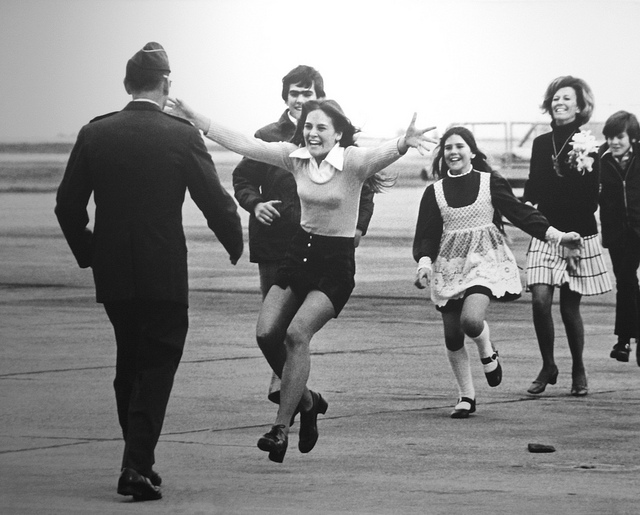“Want to support the Disabled Veterans?” she asked as I pushed my cart out of Stop ‘n’ Shop.
“Why not?” I said.
“Why not? That’s what they said when they enlisted….”
“Yeah,” I said to prevent her from giving me a speech. “My father is a veteran.”
I was surprised by my words and voice. I rarely speak of him.
“Is he still with us?” she asked.
~
Best way to to keep your core pelvic and org@sm muscles strong and resilient? Here’s the coveted apparatus that makes this possible >>
~
She said “us” like it was a pot of tea we could all sit and share. It isn’t.
She asked if he was alive as though it were a yes or no question. It’s not.
“He’s homeless” I said.
“He’s homeless?” she asked, as though maybe she hadn’t heard me.
Last I heard. As far as I know. If not dead. Did she want me to add those parts? It didn’t feel polite so I didn’t say anything.
She did.
“Why doesn’t he live with you?”
Me, who was shopping in the wealthy suburb of Hingham adjacent to Weymouth where I live. Me, out in the middle of the day on a Thursday wearing skinny jeans and a floral t-shirt. I passed for normal, casual and well-adjusted, and with room and resources to spare.
Maybe I looked like someone who had a guest room and would be welcoming. I’m not.
“Why doesn’t he live with you?”
Her question assumed we know each other, or that I’d let him near me or my kid.
Her question assumes I know he’s sober, safe and sane—and if not, that I wouldn’t mind.
“He was an alcoholic,” is the only sentence I deliver.
And violent to my mother, sister and me even before he served in Vietnam. I keep these words to myself, like sugar that dissolves on the tongue. Only it’s not sugar or sweet; it’s more bitter and toxic, like rat poison in my teeth.
I hate the way the truth I didn’t create feels like sandpaper on ears and how if I speak it I feel mean or insensitive or inconsiderate. I hate how the water evaporates in the pan, but the heat of shame is still in my cheeks and face. It’s too hot to touch, but nothing gets cooked, prepared or made that can be savored or shown. Even the handle is too hot to touch. That’s how I feel sometimes.
Until I write.
It’s not what she wants to hear, though, what anyone wants to discuss. Especially when it comes to veterans. I get it. Those coming back from Vietnam, like my father, were treated so badly that now even the truth of my own experience feels inconsiderate, insensitive or critical. It isn’t. The war causes wounds that bleed into generations.
The war of combat, violence, mental illness and addiction—there are fights still raging today.
That truth is a form of remembrance, too.
It doesn’t mean I don’t care or don’t support veterans. Or the homeless.
I, too, wanted to help, and have tried. I worked at a shelter for homeless families while in college.
There, I wrote vouchers for five dollar meals or buses to emergency shelters that would keep people warm when our beds were filled. Our shelter was for the “long-term homeless” who would stay for six weeks at a time.
Homelessness is something I care about. Know about.
Sometimes I feel like I’m related to homelessness. The daughter of homelessness.
It’s a worthy cause.
I wouldn’t dare argue that.
I stared at her salt and pepper hair as she put her hand into a pile of paper flowers. They were blue, with six petals and a little yellow bead at the center.
Forget-me-nots.
She gave me a paper flower and I attached it to a green piece of wire. I pictured twisting it around my finger like a string to remind me I, too, was fathered.
Forget-me-not.
Once, in Alaska, I tip-toed on the tundra. There, like me, the dirt had been ravaged by ice and then, somehow, freed. The buds were all tender, and there were no bushes or trees. For miles it was tiny delicate flowers.
It wasn’t until decades later I learned that forget-me-nots hold their fragrance in by day but at night perfume the sky. When no one can see.
Their perfume is private.
“Why doesn’t he live with you?”
I am his forget-me-not daughter I want to say, not the other way around. But some questions have no answer.
That was true in childhood, too, when I learned to back out of conversation heading towards what fathers do or where they live or how old they are. Mine was gone and absent, and there was no way to say so without sounding sad, self-pitying or dramatic.
I find my own ways to love and perfume the world on the page when my words can be said without looking into someone’s face.
In childhood I learned to store words unsaid in my teeth and tongue and skin. It’s where I learned some questions aren’t born of curiosity or inquiry. Some questions are punches. Accusations.
And the answers that are true are unwelcome even now, and live unsaid in me. Sometimes, they come back to me in bed, before or after sleep when the mind is fluid and flowing and drifts from sand and land to subconscious waters within.
I think of all the questions I never answered and wonder what I might say if I felt I could speak the truth. How it would feel for the honest truth to be welcome to arrive?
He is the presence of absence, a baby tooth that fell out and I had to grow up around. In that space.
Families that never worked like family is supposed to can’t offer in-house solutions to social problems. This is true for daughters of veterans, but also others. We can’t always reach those nearest to us. Siblings. Lovers. Friends. Children. Parents. Those who are mentally ill or drug-addicted or wandering.
I am not alone in this.
A truth felt especially as we approach the holidays.
Sometimes I want to scream out and in the world, “We are all equally responsible for the care of each and every other. Veterans. Children. Homeless people. Those who are abused.”
I’m the daughter of homelessness, war and addiction. I’m the daughter of trauma, rage and abuse.
I want to ask questions too.
Who are you to drill me? What do you know? Why doesn’t homelessness live with you? Who lives in your guest room?
I want to ask people to consider that we family members may have searched to find, feed and love our homeless relatives. Maybe we are pained and puzzled. Maybe we managed whole lives without people we needed. Still need.
I want to say we are not selfish or cruel or indifferent.
I want to ask, “What do you imagine you would do or be if you were me?”
I’m daughter to a man I don’t know and didn’t walk out on.
Why doesn’t he live with you? She asked, as if it were my question to answer.
Am I alone in this?
Do I own this problem now, even though I have not received one birthday card, one lengthy hug, one buoyant greeting ever when my father’s voice got to rain into my skin?
Why doesn’t he live with you?
I wonder why he chose not to be in my life.
He didn’t love me or want me or know how to be there. He never tried to find me. He was broken and a people breaker. I don’t know. I don’t f***ing know.
Those aren’t the words I can say in a grocery store lobby.
“That’s why you’re here,” I said, “to help.”
That I could say.
We did an eye contact exchange and I shrugged. I don’t know how to care for my father. Or why I even care about him at all to be honest. Only that I do. So I gave her money and got a flower and when I took it in my hand I spun it ’round like it was a gift. A gift a daddy might give his little girl.
I gave that gift to myself as a close to 50-year-old woman who fathers herself.
Who is not a little girl and who had to grow up.
I am a mother now. I made a life despite him, though, and headed home to cook my daughter’s favorite meal: tacos.
It’s to her I attend. It’s her for whom I am responsible. And me. I save who I can. I don’t forget his name, his face, his service or his absence.
He doesn’t live with me. He hasn’t since I was a baby. I have his teeth, his last name and his DNA, though.
He doesn’t live with me. I don’t even know if he is dead or alive. And even without knowing, I know something else.
He lives in me.
[Author Note: My father is confirmed as dead. A fact confirmed by my sister via the Social Security office yesterday. When I’m ready, I’ll drive to Mt. Hope and see if there’s anything at all marking his death. Or life.]
~
Relephant Read:
A Letter to an Absent Father.
~
Author: Christine “Cissy” White
Editor: Toby Israel
Photo: Ruby Lane Photography/Flickr // Cliff/Flickr
~

 Share on bsky
Share on bsky







Read 3 comments and reply